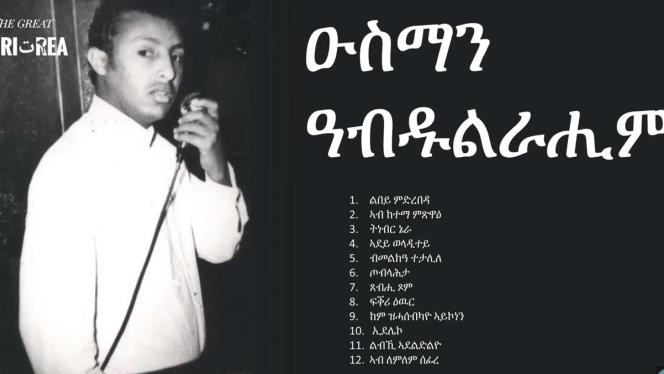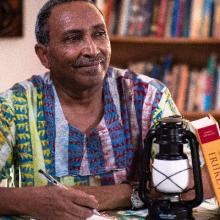Thursday 21 November 2024
Osman Abdulrahim: Eritrea’s revolutionary artist

Osman Abdulrahim is considered one of the pioneers of modern Eritrean music but his influence also extended to politics where his verses stirred the Eritrean liberation movement.
As a songwriter, composer, and singer, Osman Abdulrahim’s journey over the span of 60 years was far more than mere entertainment. With a voice that stirred hearts and rang out in revolutionary anthems, Osman Abdulrahim sang not only of love but of a nation yearning for freedom. His music encompassed a wide range of themes, from social life and sport to friendship, family, and nature. His legacy is deeply embedded in the heart of Eritrean music, with over one hundred timeless hits. Yet beyond his talent, he was a man of great kindness and generosity, his broad smile a beacon to all around him. He was cherished by all, crossing the boundaries of age, gender, and faith—loved by the young and old, men and women alike, Christians and Muslims.
His love for music began at the tender age of seven. In a time when the only source of entertainment was the radio, which few could afford, Osman’s world expanded through the melodies drifting from Radio Omdurman in Sudan. Captivated by the songs of Mohamed Wardi, he would write down the lyrics and sing them aloud. He also immersed himself in the music of legendary Egyptian artists of the time—Umm Kulthum, Mohamed Abdel Wahab, and Farid al-Atrash. His introduction to western music came through the American Kagnew Station FM Radio, which broadcast music 24 hours a day from 1943 until its closure in 1977, as the liberation war intensified. He also watched Indian films, which, along with his other influences, also left a mark on the music he composed. By the age of eleven, his voice had gained him local fame, and he performed at family gatherings and private events, quickly becoming a favourite among the youth.
In an interview with Radio Aserna, Osman spoke of his early life, having been born in Massawa before his family moved to Asmara. They settled in a neighbourhood nestled between the Orthodox Church and the Grand Mosque—a place that likely shaped his deep respect and tolerance for Eritrea’s religious diversity. He lived in Asmara until December 1974, when his path took a new turn. Along with several other artists, including the legendary Yemane Barya and Yitbarek Gebre Tensae, and as part of the Venus Musical Band, Osman joined the Eritrean Liberation Front (ELF).
The ELF later allowed them to travel abroad, spreading their music and message far beyond Eritrea’s borders. Osman was imprisoned several times in Eritrea when the authorities, rightly or wrongly, interpreted his songs as supporting Eritrea or the liberation struggle. One such song was Ab gezana zelekhom seb kray whose lyrics attacked the occupation of Eritrea vowing that the natives would return: “To those of you who live in our house as tenants, the time has come for you to leave immediately, as my family will soon return to reclaim the space. It is a great crime to oppress people”.
When the Ethiopian government attempted to inflame regional tensions among the provincial football clubs in Eritrea, Osman’s song Ane Eye Sport (“I am sport, we are sport”), called for unity and denounced tribal and regional divisions, helping to ease the tensions. While his early musical influences came from the radio, his formal education played an equally pivotal role in shaping his worldview.
He began his education at the Islamic Religious Institute near the Grand Mosque, where he excelled, completing his studies with great distinction by the age of 11. Although he was offered the opportunity to continue his education in Egypt, his family declined due to his young age. He then attended secondary school at the Arab Community School in Asmara, where instruction was in Arabic. His educational journey also included a year at the Protestant School and another year at the Agazian School, further enriching his diverse academic background. His education contributed significantly to his musical career enhancing his ability to fuse diverse influences.
Locally, Osman followed in the footsteps of artists who had paved the way before him, drawing influence from figures such as Ato Berhan Segid, Tewolde Reda (who introduced the electric krar, a traditional guitar), Tekabo Woldemariam, Alamin Abdullatif, and Younis Ibrahim. He initially applied to join the Asmara Theatrical Society (MTA), but his application was declined out of respect for his family, as the association did not wish to offend his parents.
Osman would often draw inspiration from the words or melodies of these various influences, adapting them to fit Tigrinya music, his mother tongue. Ethiopian radio broadcasts, which were in Amharic, were limited to just a few hours a day, and music was restricted during the 40 days of Orthodox fasting. However, when Asmara Radio Station was established in 1969, broadcasting in Tigrinya, Tigre, and Arabic, his reach expanded significantly, helped by the government’s installation of sound-enhancing microphones in Asmara’s markets.
During the Italian period and beyond, Asmara was a vibrant hub of entertainment. Between 1937 and 1939, the city boasted ten cinemas and a theatre. By the 1960s, Asmara was home to about ten bands, including Rocket, Roha, Venus, Saba (Black Soul), the Police Orchestra, and others. Asmara has always been very liberal compared to its conservative surroundings and the rest of the country. A Sudanese visitor in the 2000s described it as a “Satanic Implant”, where you could find a bar between two bars. Osman was encouraged to apply to the MTA, but due to his young age and the respect the association had for his family, he wasn’t accepted. As a result, Osman left for Addis Ababa to seek new opportunities and try his luck in a larger arena.
A lost love letter that propelled him to the stage
At the age of 15, Osman Abdulrahim travelled to Addis Ababa, where he entered a competition with 500 hopefuls from across Ethiopia, all vying for a spot as a singer. Osman was one of the final four selected from the pool of 500. His first song, Figri Uwor Amine (“Trusted a Blind Love”), became an instant hit. When he performed it at the renowned National Theatre in Addis Ababa, the audience gave him a standing ovation, demanding an encore. When Ethiopian TV launched in 1964, his song was featured, further boosting his fame. Remarkably, Osman had begun writing the song at the age of 13, composing the music shortly thereafter. The inspiration for the song came from a chance encounter. One day, while walking, he stumbled upon a letter that had fallen to the ground. Upon opening it, he discovered it was a love letter from a man to his beloved, speaking of a blind, unconditional love. The letter ended with a simple phrase in English: "Love is blind."
Osman Abdulrahim’s influence on Eritrean music is profound, as his work reflects the social, cultural, and political evolution of Eritrea over the past several decades. His ability to turn personal experiences and chance encounters into moving, timeless songs has cemented his place in the country’s musical legacy.
He narrates stories through his songs. In his ballad Ab Ketema Mitsewa (“In the City of Massawa”), Osman Abdulrahim tells the story of a lover sitting alone by the sea, lost in memories of past loves. As the sunset fades and evening settles in, the lover is consumed by a deep sense of longing and sadness, overwhelmed by thoughts of love. In the stillness of Risi Medri, the world around him is quiet, but his emotions are turbulent. Through his sorrowful voice, Osman pleads with the women of his homeland not to abandon those they have loved. The song, with its melancholic and tender tone, transports listeners to the shores of Massawa or any place evoking personal reflections on love, loss, and the quiet beauty of the setting sun. Osman described the song as a flowing stream, timeless and suited to any era. It took him several months to complete both the lyrics and the music.
In the song Tenebir Nera, a young man, exhausted from searching the streets of Asmara for his lost lover, seeks solace in a cinema. As the winter sky looms heavy with clouds and the first hints of rain appear, his thoughts turn to the lover who never showed up. While watching the film, he suddenly spots her sitting alone, her silhouette illuminated by the dim lights. He does not approach her but watches in silence. After the movie ends at midnight, he quietly follows her into the still night, drawn to her without fear or suspicion, simply wanting to know where she will go. The story ends here, leaving the listener to imagine what happens next. It reflects a time when Asmara’s streets were safe, and the song’s atmosphere pulls you into the city’s quiet, midnight rhythms, inviting you to wonder what thoughts passed between them.
Osman sang primarily in his native language of Tigrinya, but he also sang in Tigre and Arabic, with equal popularity. He sang of love, social justice, and mothers, performing in Sudan, Saudi Arabia, and Europe. He eventually settled in Sweden were his star continued its rise.
Osman Abdulrahim was the only African among five Swedish immigrant artists hailing from Africa and the Middle East who were featured in Best of Sweden and who toured Sweden in 2015 under the direction of musical director Andreas Unge. The Press release said: “Osman continued to deliver love song classics from the 60s and 70s and is celebrating 50 years as an artist this year (2015). Among his countrymen, he is called Eritrea's Elvis Presley or Tom Jones.”
His contemporaries’ views
Dehab Faytinga, the renowned Eritrean female artist who brought Eritrean songs to the global stage through her performance of Kunama and dance, described Osman as a star artist and “an art in himself,” the father of Eritrean unity and love, who played a pivotal role in mobilising youth for the liberation of Eritrea. Other Eritrean artists, musicians, and singers described him as a man of unique talent.
Yared Tekeste, a promoter, festival producer, DJ, and music enthusiast based in Uppsala, Sweden, described him as: “The legend who, for 60 years, touched and inspired generations of Eritreans, as well as many people in the region and beyond. Apart from his most iconic love songs, I will always praise him for composing some of the most inspiring, conscious, and revolutionary songs about unity, such as Ane Iye Sport (‘I Am Sport’), Felsifna Gedli (‘The Revolution’s Philosophy’), and his latest song from 2021, Betri Haqy Alilla (‘The Truth Has Spoken’).”
The last song highlights the first civilian demonstration in Asmara in October 2017, a reaction to the imprisonment of the 92-year-old veteran Haji Musa, who publicly challenged the state’s interference in religious schools and later died in prison. The song also reflects on the 2013 military uprising in Asmara and Eritrea’s long struggle for freedom.
Osman Abdulrahim is considered one of the pioneers of modern Eritrean music. He is best known for blending traditional Eritrean sounds with modern influences. Osman transcended the role of an artist—he became a voice for a nation, a symbol of unity, and a reminder of the power of music to touch hearts, inspire minds, and bridge divides. As the final notes of his music echo through Eritrea, Osman Abdulrahim’s legacy remains, a testament to how art can inspire, heal, and ignite a revolution. He passed away on the 8th of September and was laid to rest on the 13th. He is survived by four sons (two of whom have followed in his footsteps) and a daughter.










